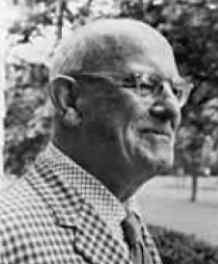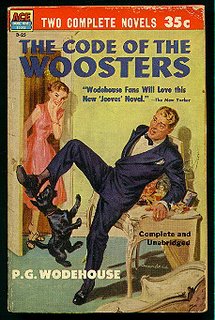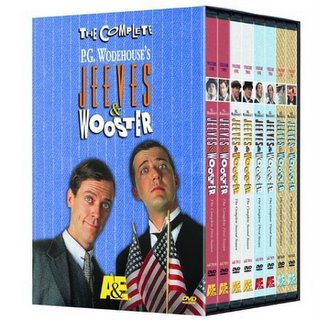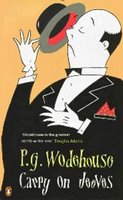
On Tuesday, Cara blogged about laugh-out-loud Regencies. As an author who tries, in her own modest way, to get people to laugh, it made me think about where my humor comes from. Some of it is unique to me: a father who loves language so much he’s got a wall full of word books (and, by the way, owned a copy of the 1811 Dictionary of the Vulgar Tongue long before I knew what a cully was), an abiding love for the Marx Brothers, stoked by frequent afternoon visits to the Harvard Square Theatre, not to mention devouring Scooby-Doo at an early age. Oh, those meddling kids!
But probably the most formative source was P.G. Wodehouse.  Like most everything else I read when I was young, I found his books in the room we called the library, but was really the place we threw all the books in the house (Bookcases were optional). I started with a Jeeves book, I’m fairly certain, and was immediately entranced with Wodehouse’s dextrous way with language. Simply put, the man is incredibly dry, terribly witty, and flat-out hysterical.
Like most everything else I read when I was young, I found his books in the room we called the library, but was really the place we threw all the books in the house (Bookcases were optional). I started with a Jeeves book, I’m fairly certain, and was immediately entranced with Wodehouse’s dextrous way with language. Simply put, the man is incredibly dry, terribly witty, and flat-out hysterical.
I grabbed a recent stoop sale find, A Wodehouse Bestiary, and opened it randomly to find this little gem:
“You’re what I call a rabbit.”
“A rabbit!”
“There is no stigma attached to being a rabbit,” said Sir Joseph, pacifically. “Every man with a grain of sense is one. It simply means that you prefer a normal, wholesome life to gadding about like a — like a nonrabbit. You’re going out of your class, my boy. You’re trying to change your zoological species, and it can’t be done. Half the divorces today are due to the fact that rabbits won’t believe they’re rabbits till it’s too late. It is the peculiar nature of the rabbit–”
“I think we had better join the ladies, Uncle Joseph,” said Roland, frostily. “Aunt Emily will be wondering what has become of us.”
Dry as a bone. I love it.
I’ve read every Wodehouse I could lay my hands on. And since he published ninety-six books, I’m fairly certain there are some I have missed–a treat I’ll save for my golden years. His Jeeves & Wooster books were turned into a miniseries, but even actors such as Hugh Laurie and Stephen Fry in the titular roles aren’t able to translate Wodehouse’s delicate touch from the page to the screen.

Hugh Laurie, who portrayed Jeeves in the British miniseries, writes about Wodehouse (full text by following this link):
To be able to write about P. G. Wodehouse is the sort of honour that comes rarely in any man’s life, let alone mine. This is rarity of a rare order. Halley’s comet seems like a blasted nuisance in comparison.
If you’d knocked on my head 20 years ago and told me that a time would come when I, Hugh Laurie – scraper-through of O-levels, mover of lips (own) while reading, loafer, scrounger, pettifogger and general berk of this parish – would be able to carve my initials in the broad bark of the Master’s oak, I’m pretty certain that I would have said “garn”, or something like it.
(As a sidenote, both Laurie and his partner, Stephen Fry, who played Wooster, are also published authors in addition to being actors. Stephen Fry talks about Wodehouse here).
Humor is so hard to convey. Too much, and you’re doing slapstick; too little, and all you get is a wan smile. P.G. Wodehouse achieved the perfect (dry) balance in most of his writing.
Have you read Wodehouse? If not, there are plenty of short story collections that’ll give you a taste of his style. If so, do you like him? What other humor authors, outside of romance, do you like? What’s your favorite kind of written humor?
Me, I’m dicing back into “Something Squishy” from A Wodehouse Bestiary.
Megan

I love Wodehouse! Oh, my, I tore through his stuff and just laughed and laughed! And then the PBS series. Fry and Laurie were perfect! Thank for you for reminding me!
Okay, my dad, the self-proclaimed Luddite, sent this to me in response to my post:
“Hoop-de-lay, and a very hearty pip pip to you,” which i’m quite sure somebody in Wodehouse must once have said; a very nice column at Risky Regencies today.
You prompted two lines of thought, which I might have sent as Comment to the blog except (a) I still don’t know how to do that; and (b) doing so might break the mechanism on account of my predictable wordiness.
So via more Luddite-friendly email, if that oxymoron may be permitted:
1.) I’m delighted you remembered the 1811 Dictionary, a paperback which i still have. I subsequently acquired a hardcover with the proper title, “A Classical Dictionary of the Vulgar Tongue.” The book, which includes both “cull” and “cully” — distinction(s) provided upon request — appeared originally in 1785, and without a name on the title page, though it was widely known to be written by one Captain Francis Grose, a noted military historian and accomplished artist. The 1811 “edition,” I have learned, should more properly be considered a re-issue of the enlarged 3rd edition of 1796, rather than a new edition. My favorite 20th-century lexicographer and expert on slang and cant, Eric Partridge, believes the 3rd of 1796 was revised and edited by Grose before his death in 1791. The 1811 re-issue, on the other hand, purported to be by “A Member of the Whip Club,” and was actually entitled “Lexicon Balatronicum”, though it was not a new book at all, and added “extremely little” to the 1796 edition oif Grose, according to Partridge.
Another edition, published in 1823, can properly be considered something more than a re-issue, though it also relied heavily on the 3rd of 1796. It was produced by our old friend Pierce Egan, the sporting and boxing writer, best-known most likely for his “Life in London, or Days and Nights of Jerry Hawthorne and his Elegant Friend Corinthian Tom” (1821), but more appropriately noted by Regency buffs for his first book, which he wrote, set and printed in 1814: “The Mistress of Royalty, or the Loves of Florizel and Perdita,” which of course dealt (slyly) with the affair between the Prince Regent and the actress Mary Robinson that began way back in 1780 (the remove in time may be why Egan was spared the fate of Leigh Hunt, whose puportedly libellous comments on Prinny were au courant). I have never seen an original or a reprint of Egan’s 1823 edition, though I have read that there were frequent reissues well into Victorian times. Partridge concedes it had “numerous” additions by Egan which those of us fascinated by the language of the era might find interesting, but in his devotion to establishing Grose’s importance as writer of the first book that included both slang and cant (as opposed to cant alone), Partridge rather frostily dismisses Egan’s additional material as “intrusions.”
It was Partridge who first issued a 20th-century edition of Grose, in 1931, published in very limited edition by Partridge’s own Scholartis Press in London as “Francis Grose’s A Classical Dictionary of the Vulgar Tongue (3rd ed, 1796)”. Years later, in 1962, he persuaded Routledge & Kegan Paul of London to reprint it “with minor corrections” and in 1963, on this side of the pond, got Barnes&Noble to publish it under the title I noted above. It’s the 1963 Barnes&Noble that I have. It includes a biographical and critical sketch of Grose, and extensive commentary, all by Partridge.
As for my other thought:
2.) I think you have the roles backwards in the television series: I am quite sure Hugh Laurie was Bertie Wooster.
Love,
Dad
Dad:
2) you’re right. I’m confused.
I confess that I tried Wodehouse when I was a teenager and gave up rather quickly. I no longer remember why I gave up (it was, alas, over 30 years ago). Unusual for me, because throughout my life I have rarely failed to finish a book I started. So when the TV series was on PBS I never bothered watching. And when I watched “House” for the first time, I (gasp!) wondered “Who the heck is Hugh Laurie?” So, who, I ask, is the Luddite here?
I think it’s finally time for me to give Wodehouse another try.
Phyl
I love your Dad.
Anyone who can write with such fervor on various editions of dictionaries deserves a little love.
And at some point I’ll have to figure out a way to post my Dad’s statistician’s response to the graph depicting Rise in Global Temperature as a function of the Decline in the World Population of Pritates as posted by the Flying Spaghetti Monster folks.
But I think it has little to do with either Wodehouse (Whom I adore. Ha! Stayed on topic!), or with Risky Regencies.
ummm, not pritates, _pirates_
sheesh
Suisan:
I love my dad, too.
And yours sounds about as geeky as mine.
Thank you.
I have a bunch.
Must go re-read.